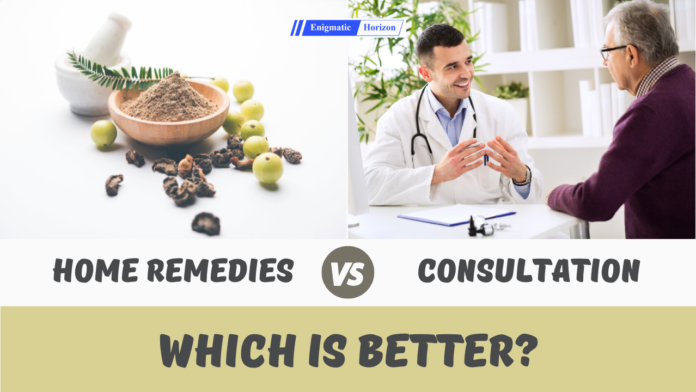Ankita Naskar
For centuries, people have relied on natural home remedies to treat various ailments and diseases. Passed down from generation to generation, herbal and natural treatments have become an integral part of many cultures and traditions. In recent times, with the advent of modern medicine, many have started considering consulting a medical professional as the first line of treatment. However, home remedies and herbal medicines still hold merit and can be effective. In this article, we will explore the significance of home remedies and alternative medicinal systems like Ayurveda. We will also discuss when it may be more prudent to seek professional medical advice.
The Power of Nature’s Bounty
Nature has provided us with a vast array of herbs, plants, and other natural substances that possess potent medicinal properties. Be it neem, turmeric, ginger, holy basil, or garlic, common kitchen ingredients often form simple but effective remedies. For example, turmeric is a powerful anti-inflammatory that helps with arthritis, wounds, and even potentially cancerous conditions. Neem is antibacterial and antifungal, effective against skin conditions. Garlic boosts immunity and lowers cholesterol. The list is endless. Ayurveda, the ancient Indian medicine system, recognises medicinal plants and herbs. It offers specific formulations and remedies tailored to individual needs and body types. Studies have validated many Ayurvedic and herbal treatments. For instance, Triphala is considered very effective for digestive issues. Research also shows Ashwagandha helps manage anxiety and stress.
Home Remedies Versus Allopathic Medicines
Modern allopathic drugs and treatments have revolutionised medicine in many ways. However, they also come with side effects and health risks like toxicity or chemical dependence. Overuse of antibiotics has led to drug-resistant superbugs. Painkillers and sleeping pills are addictive if taken regularly. Contrast this with home remedies and herbs that are generally free of side effects. Neem, Aloe Vera, or tea tree oil can treat skin infections with no adverse reactions. Licorice root or fennel seeds can safely relieve digestive problems. Of course, it’s important to be aware of contraindications with home remedies too. But they offer a gentler therapeutic approach overall.
Seeking Professional Help
While home treatments are valuable, there are times when you must see a doctor. Conditions like diabetes, heart disease, fractures, depression, etc. require professional care. A physician can accurately diagnose the problem and provide targeted treatments. They have the expertise to handle complicated health issues and access to diagnostic tests. In emergencies like a heart attack or severe injuries, home remedies simply cannot substitute for proper medical intervention. Chronic diseases need constant monitoring and management. Ayurvedic doctors and alternative medicine practitioners can complement conventional treatment in such cases. Their input helps manage symptoms and side effects better. But critically ill patients should always consult qualified doctors first.
Prevention is Better Than Cure
The ancient wisdom of Ayurveda places emphasis on disease prevention and building immunity. Herbal medicines mostly offer gentle healing without strong side effects. Hence, they can be taken regularly over long periods of time to maintain good health. Ayurvedic Rasayanas are known to retard ageing and boost strength and intellect. Yoga and meditation also complement herbal treatments by reducing stress and promoting relaxation. A balanced diet with seasonal foods and spices provides nourishment and protection from environmental toxins. Following these supportive home remedies helps prevent diseases and the need for heavy medication. But if illness does strike, both natural and allopathic systems have their place. Optimal health requires synchronising the two approaches.
Natural home remedies and traditional systems of medicine continue to be relevant and valuable even today. Herbal and Ayurvedic treatments offer a gentle, holistic approach to healing, coupled with disease prevention. However, modern allopathic medicine is indispensable for diagnosing and managing complex medical conditions, especially emergencies. The ideal solution is to combine the best of both worlds by using natural therapies as much as possible for wellness and prevention, and consulting medical professionals when disease strikes or cases are severe. With discernment to choose what suits each situation, we can harness the healing power of nature as well as advanced medicine.
